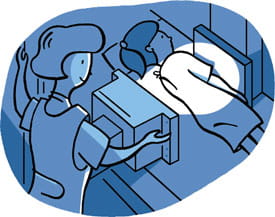X-rays are done at the Department of Pediatric Radiology of Children’s Hospital. In the room will be an X-ray technologist who is experienced in taking X-rays on children. You will see an X-ray machine connected to the ceiling, a long table, and an X-ray machine connected to the wall. You might explain to your child that the X-ray machine is a large camera for taking pictures of inside his or her body. If your child has any questions, the X-ray technologist will be happy to answer them before the test.
- Your child will be awake during this test.
- You and your child will be called for the test and asked some screening questions by the X-ray technologist.
- Your child may be asked to remove any jewelry he or she might have on and give it to you.
- Your child may be asked to change into a hospital gown.
- The X-ray picture will be taken by a large camera that uses radiation to take pictures inside the body.
- Your child will be asked to sit, stand or lie very still while the X-ray picture is being taken.
As a parent, you may have concerns about radiation exposure. Children’s takes every precaution to make sure your child is safe.
- Our goal is to do the test correctly and thoroughly, while exposing your child to the smallest amount of radiation necessary to take the X-ray.
- Advances in equipment and film have lowered the amount of radiation your child will receive.
- All of the equipment is inspected regularly.
- Parts of the body that are not being X-rayed will be protected with a lead cover or apron when possible.









 At
At